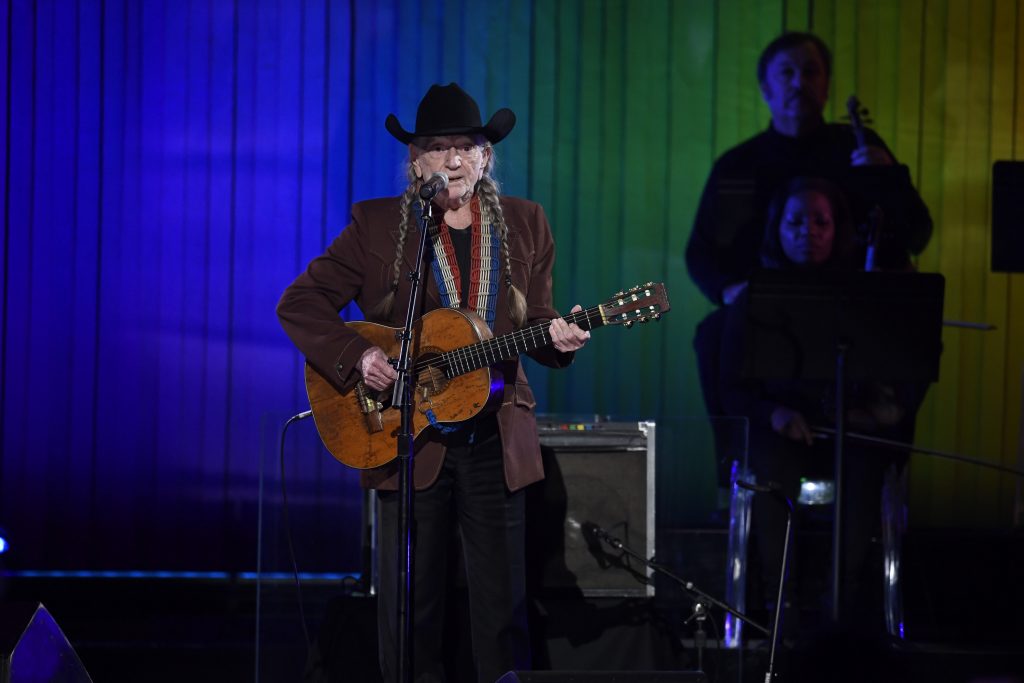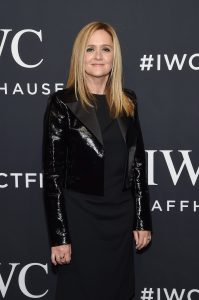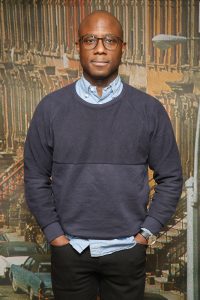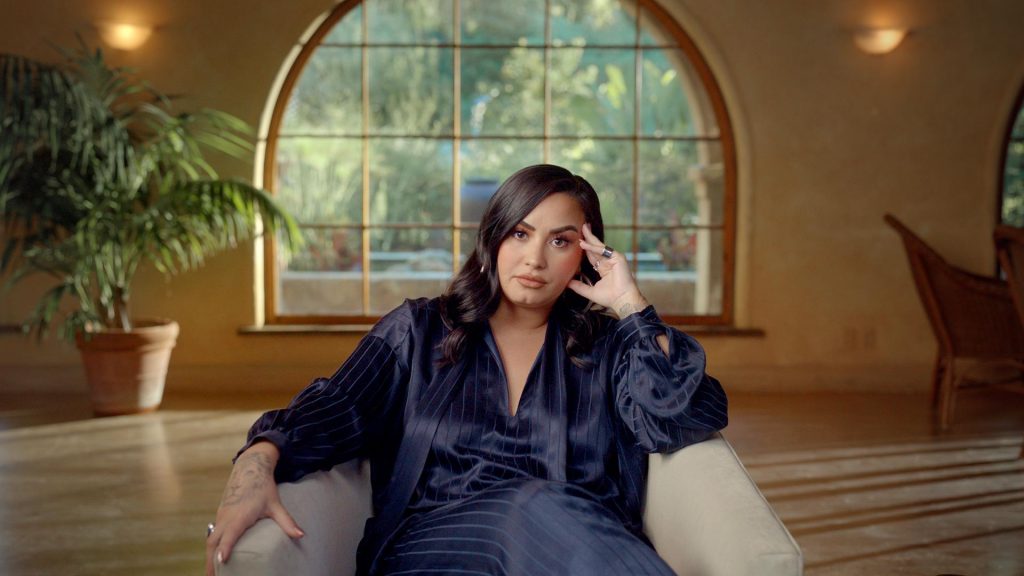March 18, 2021
by Carla Hay
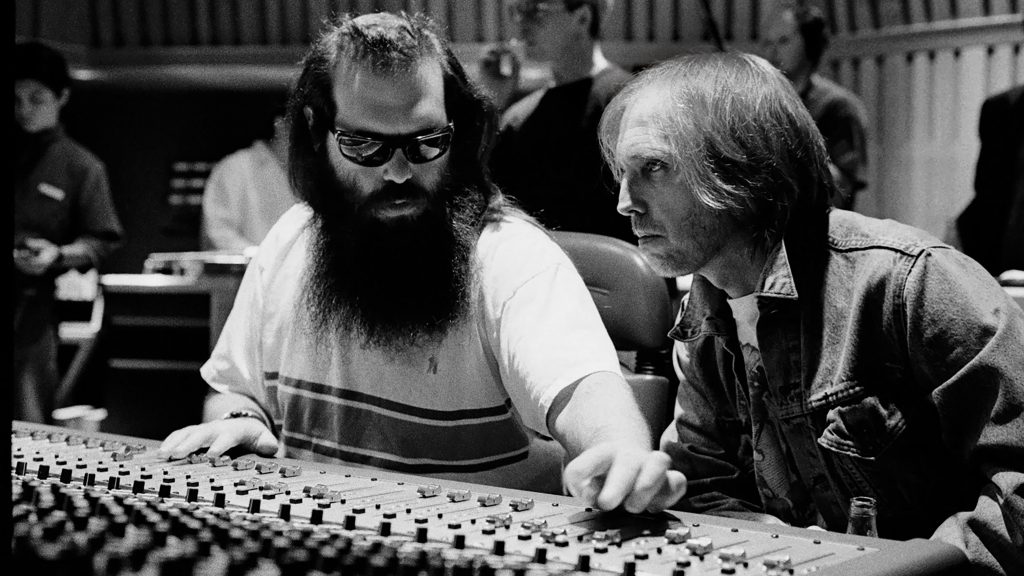
“Tom Petty, Somewhere You Feel Free: The Making of Wildflowers”
Directed by Mary Wharton
[Editor’s Note: The original title of the movie was “Tom Petty, Somewhere You Feel Free.”]
Culture Representation: Taking place primarily in Los Angeles, the documentary film “Tom Petty, Somewhere You Feel Free” features an almost all-white group of people (and one black person) in the music industry, in this chronicle of the making of Tom Petty’s 1994 album “Wildflowers.”
Culture Clash: While recording the album, Petty was going through personal problems (such as a failing marriage), he battled with Warner Bros. Records over songs that he wanted on the album, and he fired longtime Heartbreakers drummer Stan Lynch.
Culture Audience: Fans of Petty are the obvious target audience, but “Tom Petty, Somewhere You Feel Free” will also appeal to people who like classic rock music and behind-the-scenes stories about making albums.
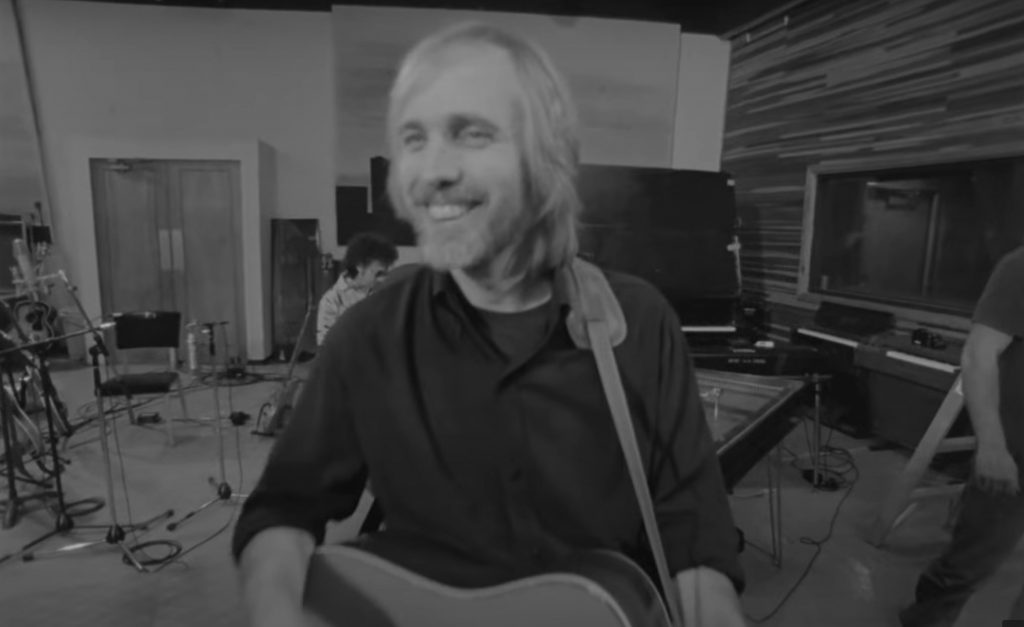
“Tom Petty, Somewhere You Feel Free” has the look and feel of many other documentaries that focus on the making of a specific album. There’s nothing really groundbreaking about this documentary, and it’s not the type of movie that people should feel like they need to see in movie theaters. The documentary is a must-see for Tom Petty’s fans and other people who are inclined to like classic rock. And it could be entertaining to people who are interested in the art of creating songs. Everyone else might think this movie is a little boring.
“Tom Petty, Somewhere You Feel Free” chronicles the making of Petty’s 1994 “Wildflowers” album, which he said in many interviews was the best album he ever made. The album was recorded at the Los Angeles recording studios Sound City and Ocean Way Recording. And musically, it was a departure for Petty because it didn’t have as much of the signature jangly guitar sound that’s on his previous albums. Instead, “Wildflowers” included a full classical orchestra and had songs with a more somber or pensive mood than his previously released tunes.
Petty died of an opioid drug overdose at age 66 in 2017. Years earlier, he revealed that he was addicted to heroin from 1996 to 1998. Therefore, Petty’s drug addiction is not an issue that’s brought up on this documentary, since the most serious years of his addiction happened after “Wildflowers” was made. In the documentary, there is some mention in Petty’s own words about how unhappy he was in his marriage to his first wife Jane at the time he made “Wildflowers.” The former spouses were married from 1974 to 1996.
Directed by Mary Wharton, “Tom Petty, Somewhere You Feel Free” (which premiered at the 2021 SXSW Film Festival) consists primarily of archival footage of Petty in the recording studio that was originally filmed in color but is, for the most part, presented in black and white in the documentary. A prologue in the documentary explains that the archival footage from these “Wildflowers” recording sessions and the subsequent tour were filmed on 16mm film between 1993 and 1995 by Petty’s longtime videographer Martyn Atkins. The footage was discovered in an archive in early 2020.
Also in black and white is more current documentary interview footage of surviving members of Petty’s band The Heartbreakers, as well as music producer Rick Rubin, who all worked on “Wildflowers” and share their fond memories of those recording sessions. The documentary mostly sticks to celebrating Petty’s music and the camaraderie that he had with his band members, Rubin and other people involved in making the album. There is some but not a great deal of insight into the drama that went on behind the scenes with Petty battling MCA Records (his former record label) and starting fresh with Warner Bros. Records, with “Wildflowers” as his first album released by Warner Bros.
“Tom Petty, Somewhere You Feel Free” is at its best when viewers get to see how the “Wildflowers” songs were crafted and recorded. There are the hits, of course, such as “You Don’t Know How It Feels,” “You Wreck Me” and “It’s Good to Be King.” But there are also several album tracks (including “Harry Green” and “Climb That Hill Blues”) that didn’t make it on to the original release of the 15-song “Wildflowers,” because Warner Bros. disagreed with Petty’s wishes to release “Wildflowers” as a 25-song double album. In 2020, the deluxe package album “Wildflowers & All the Rest” was released with the original “Wildflowers” album, plus previously unreleased studio tracks and live recordings from the “Wildflowers” era.
Even though the Heartbreakers were part of the recording sessions for “Wildflowers,” the album was officially a Petty solo record, and it was the follow-up to his wildly successful 1989 solo debut album, “Full Moon Fever.” Jeff Lynne, the mastermind of Electric Light Orchestra (ELO), produced “Full Moon Fever” and the Tom Petty and the Heartbreakers’ 1991 album “Into the Great Wide Open,” as well as several albums from other artists. Lynne was also a bandmate of Petty’s in their all-star supergroup the Traveling Wilburys, whose other members were George Harrison, Bob Dylan and Roy Orbison.
In the documentary, Rubin talks about how he was flatly turned down by MCA when he offered to produce Petty’s second solo album. “I was told that Tom worked exclusively with Jeff Lynne, and there was no chance that I’d ever get to work with him [Tom Petty]. It was a cold brush-off.”
Up until that point, Rubin was mostly known in the music business for working in hip-hop (he co-founded Def Jam Records) or producing rock artists who were younger than Petty, such as Red Hot Chili Peppers. In the late 1980s, Rubin left Def Jam and founded Def American Recordings, later renamed American Recordings. Def American’s biggest successes in the early 1990s were the bluesy rock band the Black Crowes and the thrash metal band Slayer.
And so, by the early 1990s, Rubin wasn’t exactly the first person people had in mind to produce Petty’s second solo album. By his own admission, Rubin says in the documentary that he wasn’t even a fan of Petty’s music until he heard the “Full Moon Fever” album and became obsessed with it.
But three things happened that helped Rubin to become the producer of the “Wildflowers” album.
- (1) Tom Petty and the Heartbreakers left MCA Records and signed to Warner Bros. Records, the record company for Red Hot Chili Peppers, a funk-influenced rock band had its first major breakthrough success with the Rubin-produced 1991 album “Blood Sugar Sex Magik.”
- (2) Petty, as he says in the documentary, was ready to make some big musical changes.
- (3) Heartbreakers lead guitarist Mike Campbell recommended Rubin to Petty, and they all genuinely liked each other from the start. Rubin, Petty and Campbell are all credited with producing the “Wildflowers” album.
As Petty describes it in the documentary’s archival footage: “I love Jeff Lynne dearly, but I thought I should do something else. Mike Campbell suggested Rick. He said, ‘I think you’ll like him.’ So I called him [Rubin] up.”
It’s mentioned more than once in the documentary that Rubin and Lynne couldn’t be more different from each other as producers. Lynne is a multi-instrumentalist and a meticulous recording craftsman who likes to take pieces of songs and build them in layers. Rubin barely knew how to play guitar during the “Wildflowers” sessions, and he prefers to make records with all the band members present at the same time and recording live.
Petty explains Rubin’s producing style in the documentary: “Rick Rubin really loves music, and that’s why I decided to work with him. It’s not because of his technical skill. He plays no instrument, really. He’s learning to play guitar … He’s not a corporate man … In a way, he’s guided me back to a musical place where I feel comfortable.”
In an archival interview from the “Wildflowers” recording sessions, Rubin says, “What I have to offer is as a fan. I can come in and say what I like and what I don’t like. And I don’t necessarily know why, but just trying to be true to [Petty’s] own taste and try to steer it in a direction that feels natural and good to me.”
The documentary also has a more current interview with Rubin, Campbell and Heartbreakers keyboardist Benmont Tench sitting down together. They further discuss the contrast between Lynne and Rubin as producers. Tench comments, “The records with Jeff are beautiful pop records. And my participation was minimal on both the records. Because, you know, Jeff had an idea, and there’s a keyboard, and he’s going to play it, and that’s great.”
Tench states how Rubin’s style of producing affected the “Wildflowers” recording sessions: “This is almost like taking what you learned from Jeff and setting it free. It’s very focused on song craft and record craft, but there’s also a freedom in it that’s very cool.” Campbell adds that Rubin put more emphasis on live performances in the recording studio and by recording songs as “organic tracks and not one thing at a time.”
Also present for these recording sessions were orchestrator/conductor Michael Kamen (who died of a heart attack in 2003, at the age of 55) and George Drakoulias, a music producer who made a name for himself working as a producer and A&R executive for Def American acts such as the Black Crowes. At the time of the “Wildflowers” recording sessions, Drakoulias was still doing A&R for Def American. Unlike his then-boss Rubin, Drakoulias was a longtime fan of Petty’s by the time Drakoulias was included in the recording sessions for “Wildflowers.”
In the documentary, Drakoulias (who’s described as a “musical contributor” to “Wildflowers”) remembers with a laugh his experiences with Petty during those recording sessions: “He tolerated me. He found me amusing. Tom was a hero, and idol. ‘Damn the Torpedoes’ [the 1979 Tom Petty and the Heartbreakers album] was the record that really changed my life.”
Also interviewed in the documentary is Heartbreakers drummer Steve Ferrone, a Brit who replaced original Heartbreakers drummer Stan Lynch in the “Wildflowers” recording sessions. Ferrone later became an official member of the Heartbreakers and remained in the band until the group broke up after Petty’s death in 2017. In 1994, Ferrone was living in New York City as a session musician when he got a call about a “top-secret” audition. He didn’t know it was for the Heartbreakers until he arrived at the studio and saw Petty and Campbell there. Just like Rubin, Ferrone was recommended by Campbell to be brought into Petty’s musical inner circle.
Tench comments on how Ferrone was crucial to helping Petty achieve the sound that’s on “Wildflowers,” as exemplified by the bluesy cadence that the drums have on “You Don’t Know How It Feels.” “Ferrone was the key to cracking the code to sound different,” Tench says. In archival footage, Petty says why he decided Ferrone should be in the band: “He played instinctually. He played perfectly the first time through. And I liked him.”
As for Lynch’s ouster from the band, Petty says in voiceover commentary that it was because Lynch wasn’t fully on board with Petty’s new musical direction, and Petty got tired of what he describes as Lynch’s mercurial temperament: “He had a real explosive personality. He could be really sweet and very loving, and then he could be the biggest problem.”
Campbell says of Lynch parting ways with Tom Petty and the Heartbreakers: “We were in a quagmire of disharmony, like a marriage. It happens.” Lynch is shown briefly in archival footage, but he is not in the documentary for any new interviews.
Heartbreakers bassist Howie Epstein (who died of a heroin overdose in 2003, at the age of 47) is also seen in archival footage. Epstein comments in archival footage: “Tom and I get along real good. I’ve never had one weird moment with him.” Meanwhile, Petty says about Epstein in footage from the Wildflowers” sessions: “I really appreciate him being my friend. It’s so hard to find people like Howie in the world who are so pure of spirit.”
Even though the Heartbreakers played on “Wildflowers,” why was it labeled a solo album from Petty instead of a Tom Petty and the Heartbreakers album? Petty explained it years ago, but it’s repeated in the documentary. As he puts it: “I wanted the freedom. I really wanted to be free of the democratic process, but I think it was time to turn the corner and find another place to go. And that was ‘Wildflowers.'”
Just like on a Tom Petty and the Heartbreakers album, Petty wrote the majority of the “Wildflowers” songs himself, with Campbell getting co-songwriting credit on a few songs. Petty might not be remembered as the greatest singer or guitarist, but there’s no question that he’s considered one of the greatest American rock songwriters in music history. In new interviews in the documentary, Tench and Campbell share their thoughts on Petty’s songwriting talent.
Campbell says, “I’ve worked with a lot of people—good writers and great singers—but I’ve never seen anybody who could do that like he could. He could just pull things out of the air in the moment.” Tench adds, “Tom was a great songwriter. I had always appreciated it and know that this is incredible to be in this band. But you almost take it for granted that Tom is going to come in with a great song.”
Two of the more personal songs on “Wildflowers” is “To Find a Friend” and “Don’t Fade on Me,” which Petty says were about his crumbling marriage. “I was becoming disenchanted in my marriage at the time,” which he says in a voiceover from archival footage. At the time, he says that he didn’t consciously write about this disintegrating relationship. “But when I hear [the ‘Wildflowers’ album], I can see it was working in the back of my mind somewhere.”
Petty and Jane’s daughter Adria Petty, who is an executive producer of the documentary, comments in an interview: “At the time that ‘Wildflowers’ was being written, he was definitely going through therapy for the first time. And that was an interesting door of perception that was opening.”
Adria Petty adds, “I think that feeling of confidence and self-examination at that time made him make a lot of different decisions about his life. He did it slowly, methodically and carefully. And they were painful for him.”
One of the big changes was Tom Petty’s split from MCA. Alan “Bugs” Weidel, the equipment/clubhouse manager for Tom Petty and the Heartbreakers, says that Petty was “never really happy with MCA. He really wanted to be on Warner Bros., and when that opportunity presented itself, he jumped on it.” The documentary includes new footage of Weidel reuniting with Campbell at the “clubhouse,” where the band’s instruments were kept.
And there’s archival footage of Petty, Rubin and Kamen in a room together and eating a small cake with a Warner Bros. logo on it. As they dig into the cake, Petty remarks jokingly, “We like to record for Warner Bros. because they taste good.” Rubin and Kamen are smiling and they seem amused too.
In a separate footage, Petty is heard saying in a voiceover about parting ways with MCA and moving on to Warner Bros.: “We had a long run at MCA and a very successful one. It just felt like time in life … I really just went to work for people I know. And I trust their instincts.”
However, the disputes that Petty had with Warner Bros. over how many songs should be on the “Wildflowers” album are mostly alluded to but not completely exposed in the documentary. The movie doesn’t show any screaming arguments with record company executives or lawyers. In fact, there are no “suits” shown or interviewed in this movie. And keeping out the corporate types from being in this film is probably the way that Petty would’ve wanted it.
Rather than getting into all the recording contract issues involved with the length of the “Wildflowers” album, the documentary footage puts more emphasis on Petty having a hard time deciding which songs he wanted on the album in the first place. The feeling that the documentary wants to convey is that Petty and the rest of the musical team ended up recording a lot more songs than originally expected because of Petty’s creative output and because they were having such a great time recording the album.
In new interviews for the documentary, Campbell chokes up a little when he says that listening to the songs on “Wildflowers” after Petty’s death is “emotionally hard … but other times it’s joyous. This is a whole plethora of experiences on the record.” Tench adds, “When you lose a great artist, you appreciate them more.”
“Tom Petty, Somewhere You Feel Free” shares part of its title with Christopher McKittrick’s unauthorized biography “Somewhere You Feel Free: Tom Petty and Los Angeles,” which was published in 2020. In the documentary, it’s mentioned that the “Wildflowers” song “California” best summed up how Petty (who was a Florida native) felt about how California (specifically the Los Angeles area) changed his life. His daughter Adria says that after he moved to California, Petty was able to reinvent himself early in his career and became a success with the Heartbreakers.
People watching the documentary might feel that the black and white imagery makes the movie look dull and washed-out. Others might think having the movie in black and white gives it a classic look. There’s only one part of the documentary where it changes from black and white to color in the middle of the song. And that’s in studio footage of “Mary Jane’s Last Dance,” which was recorded during the “Wildflowers” sessions but was not on the album. Instead, the song (the last Tom Petty and the Heartbreakers song recorded with drummer Lynch) was released on Tom Petty and the Heartbreakers’ 1993 “Greatest Hits” album.
The documentary’s color footage (mostly of the band performing on stage) definitely livens up the movie, but the black and white palette probably gives the movie a more consistent look and the ability to hide some of the color footage’s flaws. One of the constant themes in the movie is how much fun it was to record the album. But for anyone who knows what it’s like to record an album, it’s not the same energy as doing a live performance.
Creativity in a recording studio is captured in stops and starts, so people watching this documentary should not expect the movie to be like a non-stop adrenaline rush. It’s more like a respectful stroll into the dynamics of Petty and his musical team. It’s not going to interest people who like to see band conflicts in music documentaries, because there are no fights or arguments in this movie. But for people who appreciate Petty’s music and talent, this documentary gives a worthwhile peek into his creative process.
UPDATE: Trafalgar Releasing will release “Tom Petty, Somewhere You Feel Free: The Making of Wildflowers” in select U.S. cinemas for two dates only: October 20 and October 21, 2021. Tom Petty’s YouTube channel will make the movie available for free viewing, as of November 11, 2021.


